Kids tend to love Greek Mythology because the stories are action packed and drama filled stories with adventure and fun rolled in! There are many great Greek Mythology Books out there for kids to learn and enjoy!
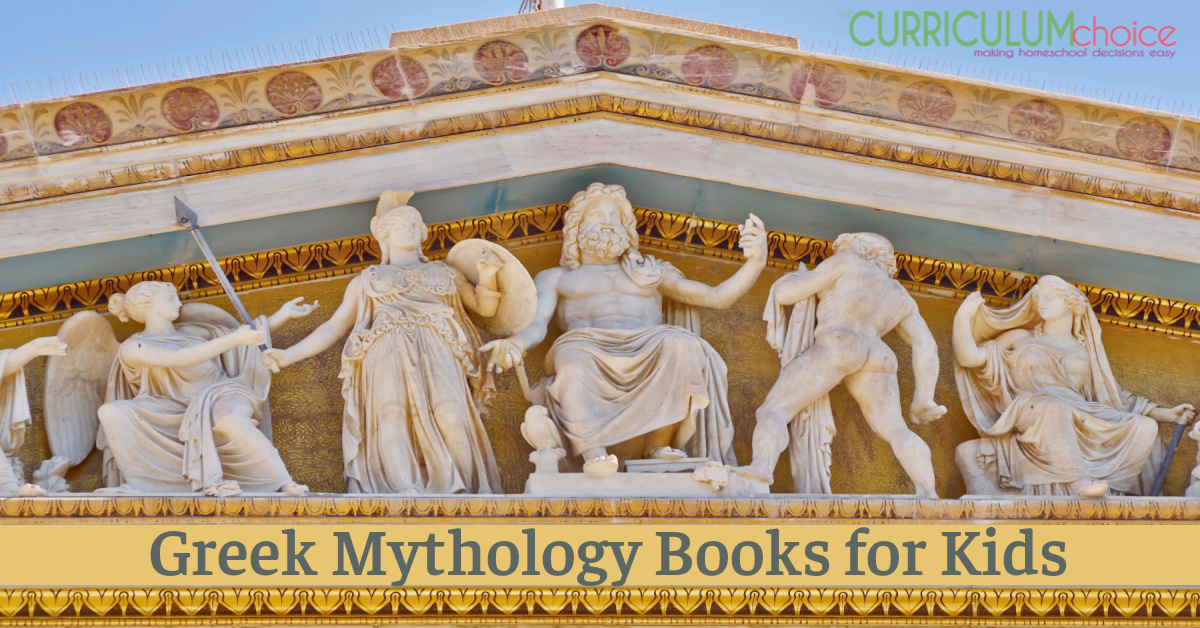
Let’s start with a quick look at Greek Mythology and why we should teach it to our children.
About Greek Mythology
In ancient Greek religion and mythology, there were 12 gods:
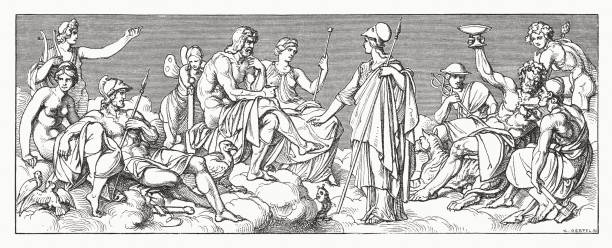
- Zeus
- Hera
- Poseidon
- Demeter
- Athena
- Apollo
- Artemis
- Ares
- Hephaestus
- Aphrodite
- Hermes
- either Hestia or Dionysus
They were called Olympians because they lived in Mount Olympus. They were immortal but looked and behaved like humans.
Why Teach Greek Mythology To Kids
There are valuable lessons in those mythologies, and reading Greek myths is an effective and fun way for kids to learn them.
For example:
Pandora’s box talks about Zeus, the God of the sky, and how he wanted to punish Prometheus for giving fire to humans. He created Pandora to be the most perfect woman ever and gave her curiosity and a special box.
Then, Zeus sent Pandora to become the wife of Prometheus’s brother, who ignored Prometheus’s warning and married Pandora right away. Thus, when Pandora could no longer resist the temptation, she opened the box, releasing all the evils into the world, except hope.
This story teaches multiple lessons:
- It is important to listen to wise people’s warnings and suggestions.
- Nothing great and desirable comes without a price.
- Curiosity can sometimes be dangerous.
An Introduction to Greek Mythology Lesson Plans

Greek mythology is not only interesting, but it is also the foundation of allusion and character genesis in literature. In this middle grade Greek Mythology lesson plan, students will gain an understanding of Greek mythology and the Olympian gods and goddesses.
After completing the lessons in this unit, students will be able to:
- Understand the Greek view of creation.
- Understand the terms Chaos, Gaia, Uranus, Cronus, Zeus, Rhea, Hyperboreans, Ethiopia, Mediterranean, and Elysian Fields.
- Describe the Greek view of the world’s geography.
- Identify the names and key features of the Olympian gods/goddesses.
- Create their own god/goddess.
- Create their own myth explaining a natural phenomenon.
Greek Mythology Books for Kids
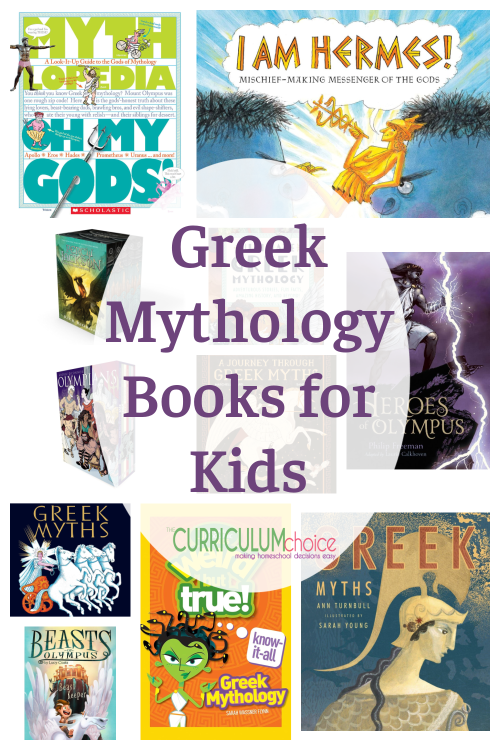
Affiliate links are used in this post and on this website. Please see our disclosure policy for more details.
I’m going to split this collection up a little bit to make it easier for you to decide what books you want to enjoy. Split in two, I’m going to list the non-fiction style Greek Mythology Books, as well as the more story-based ones. While the myths are stories themselves, some books create stories around them, and some books teach the mechanics and in and outs of Greek Mythology and the gods.
Non-Fiction Style Greek Mythology Books for Kids
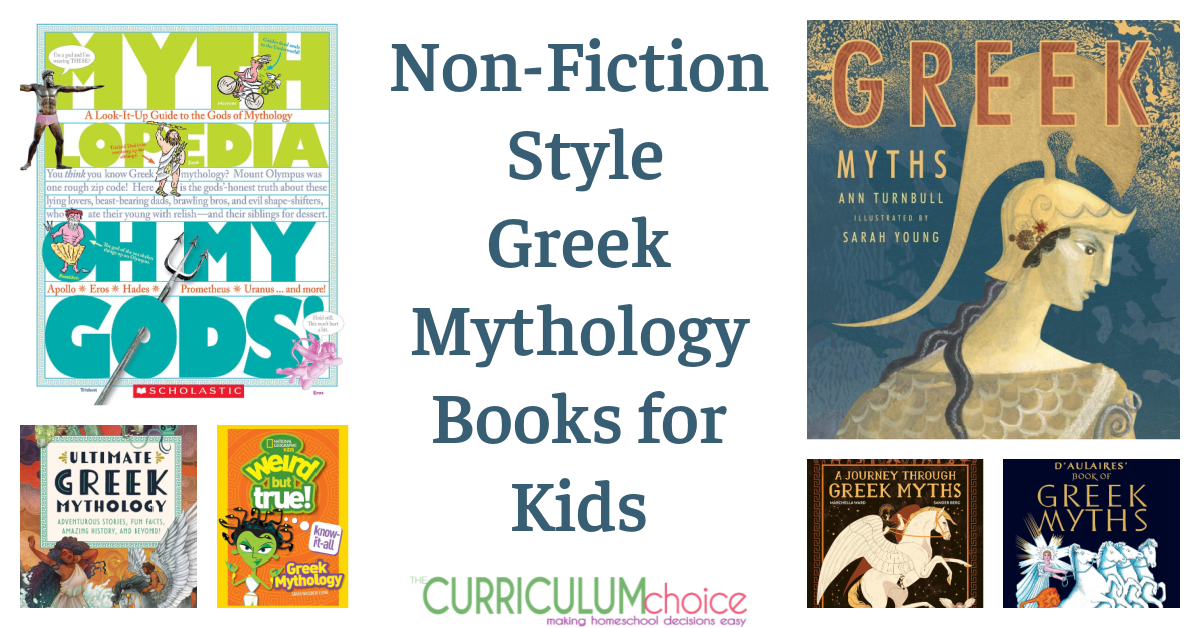
1. D’Aulaires Book of Greek Myths (ages 8-12)
This illustrated classic of Greek myths begins with the story of Gaea, Mother Earth, and continues with other captivating stories about The Titans, Zeus and his family, famous heroes, frightening monsters, and minor gods.
2. Greek Myths by Ann Turnbull (ages 11+)
Enter a world where anything is possible. A god might be a mountain or a shower of gold. A nymph may be a stream or an echo in the wind. The myths of ancient Greece are full of such wonders, as well as a host of courageous heroes, cunning heroines, and terrible monsters.
Sixteen of the most celebrated myths, from the sadness of Persephone to the ill-fated love of Orpheus and Eurydice, from Pandora’s unlucky curiosity to the greed of King Midas to many more age-old tales filled with drama and romance.
3. Weird But True Know-It-All: Greek Mythology (ages 8-12)
Zeus, Hades, Aphrodite, Hera, Poseidon, Hercules, Achilles, Ares, Apollo, Athena, Artemis, Dionysus, Prometheus! Fans of Rick Riordan will find this is the perfect companion book to dive a little deeper into the incredible stories from Greek mythology.
With quick facts, photos, and fun illustrations, the Weird but True series is a favorite with readers ages 8-12. Kids will love learning the weird facts about their favorite deities and legends from Greek mythology in this book. It covers everything from monsters and muses to philosophers and heroes.
4. A Journey Through Greek Myths (ages 8-12)
If you want a book that honors the beauty and complexity of Greek myths, look no further. This stunning book is reminiscent of the classics and will keep readers enchanted. Readers will learn about the people, places, and deities in Ancient Greece, from the Underworld to Mount Olympus.
5. Ultimate Greek Mythology (ages 6-9)
Travel to the top of Mount Olympus, where the gods and goddesses live. Get to know Zeus, Apollo, Poseidon, Aphrodite, and Dionysus and understand how they shaped the fate of humans and the world. Venture deep down to the caves and wonders of the Underworld, where Hades rules. In this mythological world, action, drama, and lessons abound, humans can achieve godlike endings, deities are flawed, and even monsters can be loved.
Kids fascinated by the world and stories of the ancient Greeks will love this nonfiction book. Readers will meet the gods, goddesses, heroes, and monsters who make up Greek mythology. With gorgeous illustrations, fun facts, and captivating stories on every page, this book is a must-have.
6. Mythlopedia Series by Sophia Kelly
This nonfiction series is so much fun! It’s essentially an encyclopedia of all things Greek mythology. Every god, goddess, and mythical creature has their own profile page with pictures, facts, and more info than you would ever need to know.
This series includes:
Story-Based Greek Mythology Books for Kids
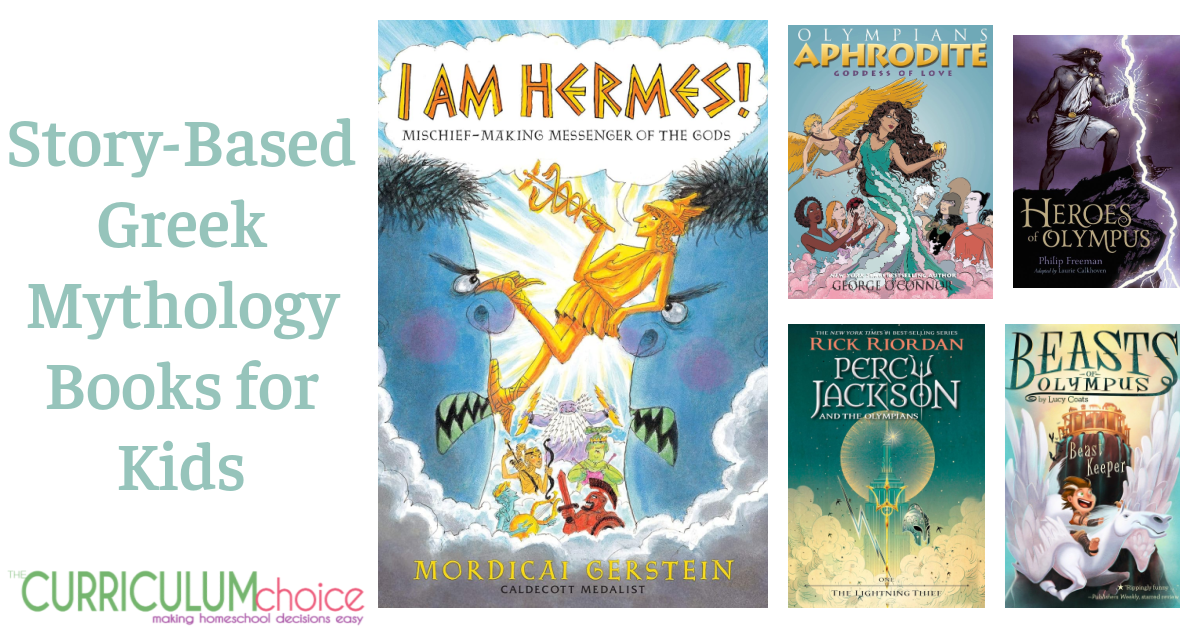
1. Heroes of Olympus by Laurie Calkhoven (ages 8-12)
Ancient myths continue to have modern relevance—for thousands of years they have been the basis for plays, operas, paintings, and movies. And in these retellings from acclaimed writer and scholar Philip Freeman, classic tales from Greek and Roman mythology find new life and inspire aspiring writers, artists, and musicians. Adapted from the lengthier Oh My Gods and specially tailored to a younger audience, these irresistible stories of philandering gods, flawed heroes, and tragic lovers portray the fundamental aspects of humanity and are filled with entertaining drama and valuable insights.
2. Percy Jackson and the Olympians Series (ages 9-12)
Percy Jackson is one of the most popular middle grade book series of all time. It’s about Percy Jackson, a 12-year-old boy with ADHD and dyslexia and a pattern of getting kicked out of school, who learns that not only are the Greek gods alive and well, and living in the United States, but his own father is Poseidon, the Greek god of the sea. That makes Percy a demi-god. He spends the series of funny, action-packed adventure books escaping from monsters, training at Camp Half-Blood, and trying to save the world from the Titans.
3. Beasts of Olympus Series by Lucy Coats (ages 7-9)
This illustrated chapter books series is all about Pandemonius (a.k.a. “Demon,” the half-god son of Pan) who is in charge of taking care of the magical beasts on Mount Olympus. Did I mention he has the ability communicate with these magical beasts? This one is super funny and full of adventure and perfect for younger readers (they’re each under 150 pages).
Kids will laugh their way through these adventures about Olympus’s new stable boy, Demon, whose ability to talk to animals helps him survive both the dangerous creatures he cares for and the unpredictable demands of the gods.
4. The Olympians by George O’Connor (age 13+)
This graphic novels series retells classic ancient Greek myths like a superhero comic. They are action-packed, fast-paced, full of monsters, some drama, and maybe a few explosions. There are a total of 12 books in this series
5. I Am Hermes! (ages 8-12)
Pre-teen readers love this book’s comic-style illustrations and lighthearted take on Hermes, the messenger of the gods. Whether making music or stealing livestock, Hermes always has a trick or two up his sleeve. Readers will laugh along with this divine mischief-maker’s shenanigans.
At birth, Hermes, son of Zeus and the Nymph Maia, says his first word: “Gimme!” In this brilliant, hilarious graphic novel about the mischievous, fun-loving messenger of the gods, Caldecott Medal winner Mordicai Gerstein, transports classical mythology to the 21st century.
BONUS BOOK: The World of Greek Mythology Coloring Adventure for Kids
This captivating coloring book is designed for young explorers who are eager to discover the thrilling tales and legendary figures of Greek mythology. A collection of over 50 illustrations that bring to life the epic stories of gods, goddesses, heroes, and mythical creatures. From the mighty Zeus wielding his thunderbolt to the brave Hercules and his incredible feats, each image is intricately drawn to inspire creativity and imagination.
More Art Options to Add to Your History Studies
Greek Art Activities for Kids – Greek art activities can teach art skills, art history, geography, ancient history, and more – all tied together with fun art lessons. You can even add a little literature and a fun snack to round it all out.
The Best Art Lessons for Your Homeschool History Curriculum – No matter what time period you are studying in your homeschool history curriculum, Nana’s I Drew It then I Knew It video lessons are the easy – and fun – way to learn important parts of history. Enjoy a library of history video art lessons to match all four history cycles no matter what homeschool history curriculum you are using. Nana does the teaching and all you need are very minimal supplies.
Fun Activities for History Class in Your Homeschool – Adding hands-on activities to any history lesson creates an immersive and engaging learning environment. This means that kids comprehend and thus retain more of their learning. Art can bring any textbook to life or enhance living history books with a multi-sensory approach!
Unit Studies for Ancient Art and the Orchestra: Elementary Through High School – Each week we study a featured work in art. We read about it, look at various examples on the internet and then try to complete a project or sketch of the type of work. Then the older children also complete a notebooking page about the piece and include it in their unit notebook.
The art topics covered in this unit are:
- Prehistoric Art
- Ancient Egyptian Art
- Ancient Greek Art
- Ancient Roman Art
- North American Art
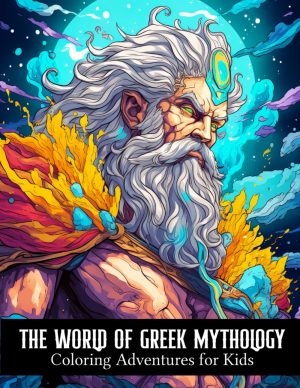
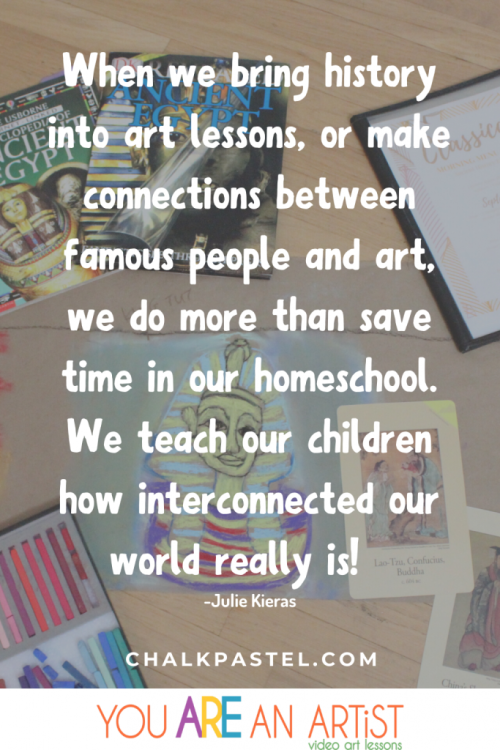

Leave a Reply